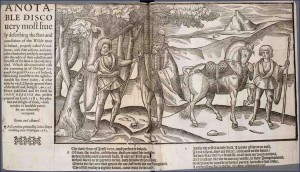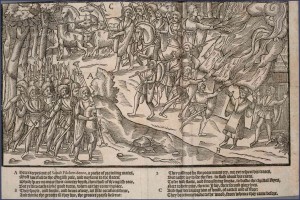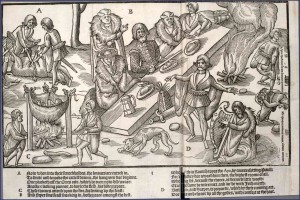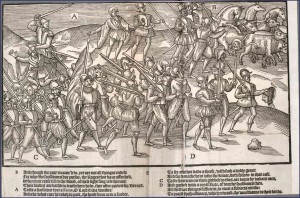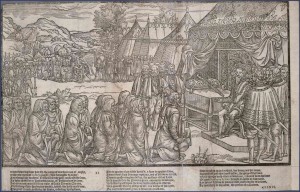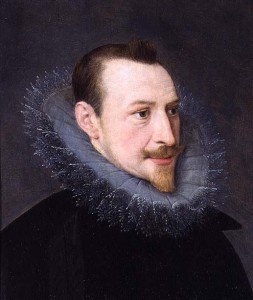DOCUMENT 1: John Derrick’s Image of Irelande (1581)
Introduction:
John Derrick’s The Image of Irelande (1581) contains some of the earliest post-Reformation representations of Irish culture by an English writer. Written in verse, the work describes the exploits of Sir Henry Sidney, who had been appointed as Lord Deputy of Ireland by Elizabeth I in 1565. During his thirteen years as Lord Deputy, Sidney used scorched earth policies to suppress Irish interests in the midlands, west, and north, and helped put down the foundations for the 16th and 17th century plantations. Derrick’s illustrations and verse depict (in negative and distorted ways) Irish customs and present an idealized view of the perceived benefits of the English conquest.
Source:
Selections from John Derrick, The Image of Irelande (1581)
Full illustrations available at http://www.lib.ed.ac.uk/about/bgallery/Gallery/researchcoll/ireland.html
Text:
Caption:
The lively shape of Irish kern, most perfect to behold,
Of man, the master, and the boy, these pictures do unfold;
Wherein is bravely painted forth, a natural Irish grace
Whole like in every point to view, hath seldom stepped in place.
Mark me the kern that grips the axe, fast with his murdering hand,
Then shall you say a righter knave, came never in the land:
As for the rest so trimly dressed, I speak of them no evil,
In each respect, they are defect (as honest as the devil).
As honest as the pope himself, in all their outward actions,
And constant like the wavering wind, in their imaginations,
Which may be proved in sundry parts, hereafter that ensue,
A perfect sign for to define, the above additions true.
Caption:
A) Here creeps out of Saint Filcher’s den, a pack of prowling mates,
Most hurtful to the English Pale, and noisome to the states:
Which spare no more their country birth, then those of the English race,
But yield to each a like good turn, when as they come in place.
B) They spoil, and burn, and bear away, as fit occasions serve,
And think the greater ill they do, the greater praise deserve:
They pass not for the poor man’s cry, nor yet respect his tears,
But rather joy to see the fire, to flash about his ears.
To see both flame, and smoldering smoke, to dark the crystal skies,
Next to their prey, therein I say, their second glory lies.
C) And thus bereaving him of house, of cattle and of store:
They do return back to the wood, from whence they came before.
Caption:
A) Now when into their fenced holds, the knaves are entered in,
To smite and knock the cattle down, the hangmen do begin.
One plucks off the dress coat, which he even now did wear:
Another lacking pans, to boil the flesh, his hide prepare.
C) These thieves attend upon the fire, for serving up the feast:
B) And Friar Smellfeast sneaking in, doth preach amongst the best.
Who plays in Romish toys the ape, by counterfeiting Paul:
For which they do award him then, the highest room of all.
Who being set, because the cheer, is deemed little worth:
Except the same be intermixed and laced with Irish mirth.
D) Both bard, and harper, is prepared, which by their cunning art,
Do busk and cheer up all the guests, with comfort at the heart.
Caption:
B) And though thy prey recovered be, yet not all things ended:
For while the soldiers do pursue, the rogues that have offended.
Who never cease till in the blood, of these light fingered thieves:
Their blades are bathed to teach them hold, they after prowl for beeves.
A) To see a soldier toze a kern, O Lord it is a wonder:
And eke what care he taketh to part, the head from neck a sunder.
To see another lead a thief, with such a lovely grace:
And for to mark how loath the knave, doth follow in that case.
C) To see how trim their glibbed heads, are borne by valiant men,
D) And guarded with a royal sort, of worth soldiers then.
All these are things sufficient, to move a subject’s mind:
To praise the soldiers, which reward, the woodkern in their kind.
Caption:
When flickering fame had filled the ears of martial men of might,
With rare report of Sidney’s praise (that honorable knight).
And though the brute in Irish soil did well confirm the same,
As who could say in England’s claim, of justice there he came,
And to maintain the sacred right, of such a Virgin Queen,
For seeking of her subjects’ wealth, whose like hath never been,
The great O’Neill, to strike the stroke, in sealing up the same,
And to prepare this noble knight, a way to greater fame,
Amazed with such strange reports, and of his own accord,
Came in prostrating him before, the presence of this lord.
With humble suit for prince’s grace, and mercy to obtain,
With like request upon the same, his friendship to attain.
Who promised then by pledge of life, and virtue of his hand,
For ever to her noble grace, a subject true to stand,
And to defend in each respect, her honor and her name,
Against all those that durst deface, the glory of the same.
Which things with other actions more, redound unto the fame
Of good Sir Henry Sidney knight, so called by his name.
Lo, where he sits in honor’s seat, most comely to be seen,
As worthy there to represent, the person of a Queen.
Document 2: Excerpts from Edmund Spenser’s View of the Present State of Ireland (1596)
Edmund Spenser is best known as an English poet (author of the Faerie Queen), but was also connected to Elizabeth’s conquest of Ireland. He first went to Ireland in 1580, as part an English expedition of internal colonization, which intended to eliminate local sources of power and impose English crown authority over the kingdom. This work was written at the end of his career, as Spenser attempted to sum up the lingering problems within the mission of internal colonization. This document can also be read as a prospectus on overseas colonization, as Spenser was part of a circle of proponents of overseas colonies, including many of the men involved in the first English colonies in North America.
The text consists of a made up dialogue between two characters named Eudoxus and Irenaeus. Eudoxus is meant to represent an ordinary Englishman who is not especially well informed about Ireland. Irenaeus is meant to represent a New English settler from Ireland, who has gained knowledge and common sense about the island through living there. It is generally agreed that Irenaeus is supposed to represent Spenser’s own opinions.
Source:
Edmund Spenser, A View of the Present State of Ireland (1596)
Original source: http://pages.uoregon.edu/rbear/veue1.html
Text:
Irenaeus: [The Irish] keep their Cattle, and live themselves the most part of the year… upon the mountains and waste wild places; and removing still to fresh land, as they have depastured the former days….
Eudoxus: What fault can you find with this custom? For… it is behooveful in this country of Ireland, where there are great mountains, and waste deserts full of grass, that the same should be eaten down, and nourish many thousands of cattle for the good of the whole Realm….
Irenaeus: But by this custom… there grew in the meantime many great enormities unto that commonwealth. For first, if there be any outlaws, or loose people, as they are never without some, which live upon the stealths and spoils, they are evermore succored and find relief only in those… waste places, where else they should be driven shortly to starve, or to come down to the towns to seek relief, where, by one means or another, they would soon be caught…. Moreover, the people that live thus… grow thereby more barbarous, and live more licentiously then they would in towns, using what means they list, and practicing what mischiefs and villainies they will, either against the government there, generally by their combinations, or against private men, whom they malign, by stealing their goods, or murdering [them]. For there they think themselves half exempted from law and obedience…
*****
Irenaeus: They have another custom, that is the wearing of mantles…. The inconveniences that thereby doe arise are much more many: for it is a fit house for an outlaw, a meet bed for a rebel, and apt cloak for a thief. First the outlaw being for his many crimes and villainies banished from the towns and houses of honest men, and wandering in waste places, far from danger of law, makes his mantle his house, and under it covers himself from the wrath of heaven, from the offense of the earth, and from the sight of men. When it rains it is his penthouse, when it blows it is his tent; when it freezes it is his tabernacle…. Likewise for a rebel it is as serviceable; for [when he]… lurks in the thick woods and straight passages, waiting for advantages, it is his bed, yea, and almost all his household stuff. For the [woods are] his house against all weathers, and his mantle is his cave to sleep in…. Lastly, for a thief it is so handsome, as it may seem it was first invented for him; for under it he can cleanly convey any fit pillage that cometh handsomely in his way, and when he goes abroad in the night in free-booting, it is his best and surest friend… he can in his mantle pass through any town or company, being close hooded over his head… [and] may under his mantle go privily armed without suspicion of any: carry his headpiece, his skene or pistol if he please, to be always in a readiness.
*****
Eudoxus: [Asks about the “Old” English settlers who had come to Ireland in the 13th century with the intention of abolishing Irish customs] … I do not think that you shall have much to find fault with any, considering that by the English most of the old bad Irish customs were abolished, and more civil fashions brought in their stead.
Irenaeus: You think otherwise, Eudoxus, than I do; for… the English… are now much more lawless and licentious than the very wild Irish….
Eudoxus: That seems very strange which you say, that men should so much degenerate from their first natures as to grow wild.
Irenaeus: …the English Lords and Gentlemen, who then had great possessions in Ireland, began thorough pride and insolence, to make private wars one against another, and, when the other parte was weak, they would wage and draw in the Irish to take their part, by which means they both greatly encouraged and enabled the Irish….
Eudoxus: Is it possible that any should so far grow out of frame that they should in so short space, quite forget their country and their own names? That is a most dangerous lethargy…
*****
Irenaeus: At the beginning of these wars, and when the garrisons are well planted and fortified, I would wish a proclamation were made generally to come to their knowledge, that what persons soever would within twenty days absolutely submit themselves, excepting only the very principal and ringleaders, should find grace…. [Those who submit will] be not suffered to remain any longer in those parts, no nor about the garrison, but sent away into the inner parts of the realm, and dispersed in such sort as they shall not come together, nor easily return if they would. For if they might be suffered to remain about the garrison, and there inhabit, as shall offer to till the ground, and yield a great part of the profit thereof, and of their cattle, to the coronel, wherewith they have heretofore tempted many, they would (as I have by experience known) be ever after such a gall and inconvenience to them, as that their profit should not recompense their hurt; for they will privily relieve their friends that are forth; they will send the enemy secret advertisement of all their purposes and journeys which they mean to make upon them; they will also not stick to draw the enemy upon them, yea and to betray the fort itself, by discovery of all defects and disadvantages if any be, to the cutting of all their throats. For avoiding whereof and many other inconveniences, I wish that they should be carried far from thence into some other parts, so as I said, they come and submit themselves, upon the first summons: but afterwards I would have none received, but left to their fortune and miserable end: my reason is, for that those which afterwards remain without, are stout and obstinate rebels, such as will never be made dutiful and obedient, nor brought to labor or civil conversation, having once tasted the licentious life, and being acquainted with spoil and outrages, will ever after be ready for the like occasions, so as there is no hope of their amendment of recovery, and therefore needful to be cut off.
Eudoxus: Surely of such desperate persons, as will follow the course of their own folly, there is no comparison to be had, and for the others ye have purposed a merciful means, much more then they have deserved: but what shall be the conclusion of this war? For you have prefixed a short time of their countenance.
Irenaeus: The end I assure me will be very short, and much sooner then can be, in so great trouble (as it seems) hoped for, although there should none of them fall by the sword, nor be slain by the soldier, yet thus being kept from manurance, and their cattle from running abroad, by this hard restraint, they would quickly consume themselves, and devour one another. The proof whereof I saw sufficiently ensampled in those late wars in Munster; for notwithstanding that the same was a most rich and plentiful country, full of corn and cattle, that you would have thought they could have been able to stand long, yet ere one year and a half they were brought to such wretchedness, as that any stony heart would have rued the same. Out of every corner of the wood and glens they came creeping forth upon their hands, for their legs could not bear them; they looked anatomies [of] death, they spoke like ghosts, crying out of their graves; they did eat of the carrions, happy where they could find them, yea, and one another soon after, in so much as the very carcasses they spared not to scrape out of their graves. And if they found a plot of water-cresses or shamrocks, there they flocked as to a feast for the time, yet not able long to continue therewithal; that in a short space there were none almost left, and a most populous and plentiful country suddenly left void of man or beast: yet sure in all that war, there perished not many by the sword, but all by the extremity of famine which they themselves had wrought.
Document 3: Historical Documents on the Plantations
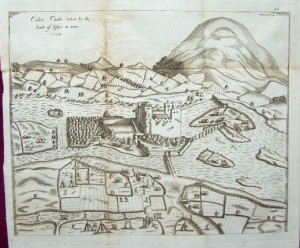
Introduction:
Beginning in the 1580s, the English state used “plantations” as a means of cementing its authority in conquered territory in Ireland. This entailed the imposition of English-style county government (including sheriffs, constables, and justices of the peace), the creations of roads and market towns, and the seizure of lands belonging to the families of those who had opposed the crown. These lands were redistributed to “undertakers” – usually English Protestant investors – who could collects rents and improve the lands. Plantation schemes usually included economic benefits for the undertakers (such as tax relief) but also required undertakers to invest in building projects, the transplantation of English tenants, and other development projects. In theory, this strategy would “plant” islands of English culture in the Irish landscape, which would eventually spread at the expense of the Gaelic population.
In the early 17th century, the English crown (James I) claimed authority over the northern counties of Ireland. This followed a long period of warfare during which the English state steadily destroyed the power of Irish nobles who had previously controlled the territory. In an effort to project English crown authority into this newly-conquered territory, James I created the Ulster Plantations. This project redistributed conquered land to English and Scottish “undertakers”. The rules for the undertakers printed below point to the crown’s interest in centralizing state authority by creating infrastructure that would reinforce crown power and limit disorder.
Source:
A Collection of Such Orders and Conditions, As Are to Be Observed by the Undertakers, Upon the Distribution and Plantation of the Escheated Lands in Ulster (London: 1608).
Text:
Whereas the greatest part of the six counties in the Province of Ulster, within the realm of Ireland, being escheated and come to the crown, has lately been surveyed, and the survey thereof transmitted and presented unto his majesty: Upon view whereof, his majesty of his princely bounty, not respecting his own profit, but the public peace and welfare of that kingdom, but the civil plantation of those unreformed and waste countries, is graciously pleased to distribute the said lands to such of his subjects as well of Great Britain and Ireland, as being of merit and ability shall seek the same, with a mind not only to benefit themselves, but to do service to the crown and the commonwealth.
*****
[To serve these purposes, land in the six counties of Ulster will be redistributed from the Irish nobility to English and Scottish “undertakers”. The obligations of these new undertakers are as follows.]Every undertaker of the greatest proportion of 2000 acres shall within two years after the date of his letters patents, build thereupon a castle, with a strong court or bawn [i.e. defensive ditch] about it. And all the said undertakers shall draw their tenants to build houses for themselves and their families, near the principal castle, house or bawn, for their mutual defense and strength. The said undertakers, their heir and assigns, shall have ready in their houses at all times, a convenient store of arms, wherewith they may furnish a competent number of able men for their defense, which may be viewed and mustered every half year according to the manner of England.
Every of the said undertakers, English or Scottish, before the sealing of his letters patent, shall take the Oath of Supremacy [i.e. the Protestant oath of allegiance acknowledging the crown as head of the Church], either in the Chancery of England or Ireland, or before the commissioners to be appointed for the establishing of the plantation, and shall also conform themselves in religion according to his majesty’s laws.
The said undertakers, their heirs and assigns, shall not alien or demise their portions or any part thereof to the mere Irish. Every undertaker shall within two years after the date of his letters patents, plant or place a competent number of English or inland Scottish tenants upon his portion. Every of the said undertakers shall be resident in person himself upon his portion, or place some such other person thereupon, as shall be allowed by the state of England or Ireland, who shall be likewise resident there.
*****
There shall be commissioners appointed for the setting forth of the several proportions and for the ordering and settling of the plantation according to such instructions as shall be given unto them by his majesty in that behalf.
In every of the said counties there shall be a convenient number of market towns and corporations erected for the habitation and settling of tradesmen and artificers, and that there shall be one free school at least appointed in every county, for the education of youth in learning and religion. There shall be a convenient number of parishes and parish churches with sufficient incumbents in every county, and that the parishioners shall pay all their tithes in kind to the incumbents of the said parish churches [i.e. Protestant churches; Roman Catholic churches had been formally abolished with the Reformation].
Document 4: The Penal Laws
Introduction:
With the conclusion of the War of the Two Kings in 1691, the English conquerors of Ireland began to put laws in place that were intended to permanently marginalize the Roman Catholic population. By the end of the first decade of the 18th century, these laws had created structures that made it difficult for Catholics to own or purchase land and obtain an education. Catholics were also completely barred from serving in public offices or participating in military affairs. The following texts, excerpted from the original statutes, outline the full sweep of the Penal Laws.
Source:
Full text of Penal Laws at http://library.law.umn.edu/irishlaw/subjectlist.html
Texts:
An Act for the Relief of the Protestant Purchasers of the forfeited Estates in Ireland (1702)
Sec. 15. No papist, during the time of his professing the popish religion, shall be capable to inherit, take or enjoy any other forfeited estates or interest therein, and if any person educated in the popish religion, or professing the same, shall not, within 6 months after the accruing of his title, or of attaining the age of 18, take the oaths of allegiance and supremacy, and the declaration against transubstantiation in the courts of Chancery or Kings-bench in England or Ireland, or in the quarter-sessions where such person shall reside, and continue to be a protestants, such person in respect of himself only, and not his heirs or posterity, shall be disabled to inherit or take any of the premises, or any trust or interest in the same, and during the life of such person, or until he shall take the oaths etc., the next of kindred who shall be a protestant, shall enjoy the premises.
An Act to Restrain Foreign Education (1695)
Sec. 1. In case any of his Majesty’s subjects of Ireland shall go or send any child or other person beyond the seas to be trained in any popish university, college or school, or in any private popish family, or shall send any money for the support of any such person, then the person sending and the person sent shall, upon conviction, be disabled to prosecute any action in a court of law, or be a guardian or executor, or receive any legacy or gift, or bear any public office, and shall forfeit all their lands and estates during their lives.
Sec. 9. Whereas it has been found by experience that tolerating at papists keeping schools or instructing youth in literature is one great reason of many of the natives continuing ignorant of the principles of the true religion, and strangers to the scriptures, and of their neglecting to conform themselves to the laws of this realm, and of their not using the English habit and language, no person of the popish religion shall publicly teach school or instruct youth, or in private houses teach youth, except only the children of the master or mistress of the private house, upon pain of twenty pounds, and prison for three months for every such offence.
An Act for the further regulating the Election of Members of Parliament (1727)
Sec. 7. No papist, though not convicted as such, shall be entitled to vote at the election of any member to serve in parliament, or at the election of any magistrate for any city or other town corporate.
An Act to prevent Protestants intermarrying with Papists (1697)
Sec. 1. Whereas many protestant women, heirs or heirs apparent to lands or other great substances in goods or chattels, or having considerable estates for life, or guardianship of children entitled to such estates, by flattery and other crafty insinuations of popish persons, have been seduced to contract matrimony with and take to husband, papists, to the great ruin of such estates, to the great loss of many protestant persons to whom the same might descend, and to the corrupting such protestant women that they forsake their religion and become papists, to the great dishonor of Almighty God, the great prejudice of the protestant interest, and the heavy sorrow of all their protestant friends, if any Protestant woman having any estate or interest real or, if personal of a value of 500 pounds, shall take to husband any person without first having a certificate from the minister of the parish, bishop, and justice of the peace living near the place where such person shall be resident at the time of such marriage, that he is a known protestant, which certificate shall also be attested under the hands of 2 credible witnesses, that protestant woman, and the person she shall so marry, shall be incapable of holding or enjoying any of her aforesaid estates or interests.
And by such marriage all said estates and interests shall be vested in the next protestant of kin to whom such estate or interests would descend were such protestant woman dead. And such protestant person may sue for and recover such estates or interests at any time after such marriage.
Sec. 2. And whereas the marriages of protestant persons to popish maidens and women have proved pernicious to the protestant interest, it commonly happening such protestants and their issue, being influenced by their popish wives, become papists, any protestant man who shall marry any woman without having obtained a certificate as in section 1 hereof, of her being a known protestant, such protestant man shall be in law deemed a papist, or popish recusant, unless such person shall within one year of such marriage, procure his wife to be converted to the protestant religion.
An Act for the Better Securing the Government, by Disarming Papists (1695)
Sec. 1. All papists within this kingdom of Ireland shall before the 1st day of March, 1696, deliver up to some justice of the peace or corporation officer where such papist shall dwell, all their arms and ammunition, notwithstanding any license for keeping the same heretofore granted. Justices of the peace, mayors, sheriffs, and chief officers of cities and towns and persons under their warrants, may search and seize all arms and ammunition of papists, or in the hands of any persons in trust for them, wherever they shall suspect they may be concealed. And such arms shall be preserved for the use of his Majesty.
Sec. 10. No papist shall be capable of having or keeping for his use, any horse, gelding or mare of five pounds value. Any protestant who shall make discovery under oath of such horse, shall be authorized with the assistance of a constable, to search for and secure such horse and in case of resistance to break down any door. And any protestant making such discovery and offering five pounds five shillings to the owner of such horse, in the presence of a justice of the peace or chief magistrate, shall receive ownership of such horse as though such horse were bought in the market overt.
An Act to make the Militia of this Kingdom more useful (1715)
Sec 1. Whereas there have been frequent rebellions and insurrections formerly raised in this kingdom by the popish inhabitants, and whereas there is just reasons to apprehend that the main body of papists may hereafter again endeavor to disturb the public peace and tranquility, the chief governors of this kingdom may commission certain protestants to call together all persons being protestants and form them into militia, train the same, and raise money from the inhabitants of the several counties toward the support of the militia.

